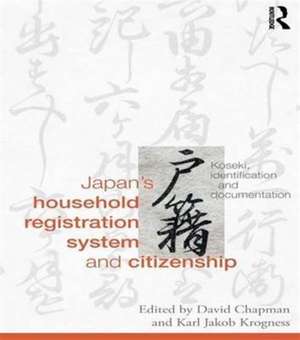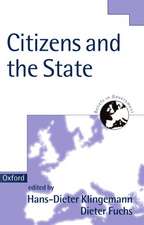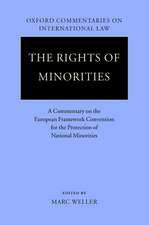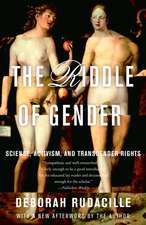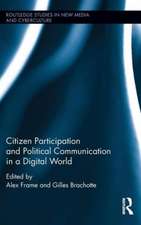Japan's Household Registration System and Citizenship: Koseki, Identification and Documentation: Routledge Studies in the Modern History of Asia
Editat de David Chapman, Karl Jakob Krognessen Limba Engleză Paperback – 21 apr 2016
By looking through the lens of the koseki system, the book takes both an historical as well as a contemporary approach to understanding Japanese society. In doing so, it develops our understanding of contemporary Japan within the historical context of population management and social control; reveals the social effects and influence of the koseki system throughout its history; and presents new insights into citizenship, nationality and identity. Furthermore, this book develops our knowledge of state functions and indeed the nation state itself, through engaging critically with important issues relating to the koseki while at the same time providing a platform for further investigation. The contributors to this volume utilise a variety of disciplinary areas including history, gender studies, sociology, law and anthropology, and each chapter provides insights that bring us closer to a comprehensive grasp of the role, effects and historical background of what is a crucial and influential instrument of the Japanese state.
This book will be of great interest to students and scholars of Japanese history, Japanese culture and society, Japanese studies, Asian social policy and demography more generally.
| Toate formatele și edițiile | Preț | Express |
|---|---|---|
| Paperback (1) | 413.33 lei 6-8 săpt. | |
| Taylor & Francis – 21 apr 2016 | 413.33 lei 6-8 săpt. | |
| Hardback (1) | 1062.26 lei 6-8 săpt. | |
| Taylor & Francis – 27 feb 2014 | 1062.26 lei 6-8 săpt. |
Din seria Routledge Studies in the Modern History of Asia
-
 Preț: 326.40 lei
Preț: 326.40 lei -
 Preț: 311.41 lei
Preț: 311.41 lei -
 Preț: 317.76 lei
Preț: 317.76 lei -
 Preț: 310.95 lei
Preț: 310.95 lei -
 Preț: 311.91 lei
Preț: 311.91 lei - 9%
 Preț: 901.51 lei
Preț: 901.51 lei -
 Preț: 379.30 lei
Preț: 379.30 lei - 25%
 Preț: 711.72 lei
Preț: 711.72 lei - 18%
 Preț: 1278.70 lei
Preț: 1278.70 lei - 18%
 Preț: 948.84 lei
Preț: 948.84 lei - 18%
 Preț: 1055.21 lei
Preț: 1055.21 lei - 18%
 Preț: 1331.76 lei
Preț: 1331.76 lei - 18%
 Preț: 1003.30 lei
Preț: 1003.30 lei - 18%
 Preț: 1060.87 lei
Preț: 1060.87 lei -
 Preț: 424.87 lei
Preț: 424.87 lei -
 Preț: 485.94 lei
Preț: 485.94 lei - 18%
 Preț: 1004.86 lei
Preț: 1004.86 lei - 18%
 Preț: 1326.99 lei
Preț: 1326.99 lei - 18%
 Preț: 1060.87 lei
Preț: 1060.87 lei - 18%
 Preț: 1058.65 lei
Preț: 1058.65 lei -
 Preț: 441.80 lei
Preț: 441.80 lei - 28%
 Preț: 820.03 lei
Preț: 820.03 lei - 18%
 Preț: 1059.84 lei
Preț: 1059.84 lei - 28%
 Preț: 821.79 lei
Preț: 821.79 lei - 18%
 Preț: 1063.65 lei
Preț: 1063.65 lei - 18%
 Preț: 1059.84 lei
Preț: 1059.84 lei - 49%
 Preț: 218.36 lei
Preț: 218.36 lei - 18%
 Preț: 704.83 lei
Preț: 704.83 lei - 18%
 Preț: 1012.10 lei
Preț: 1012.10 lei - 25%
 Preț: 826.86 lei
Preț: 826.86 lei - 18%
 Preț: 1002.18 lei
Preț: 1002.18 lei - 15%
 Preț: 699.14 lei
Preț: 699.14 lei - 18%
 Preț: 1114.30 lei
Preț: 1114.30 lei - 27%
 Preț: 995.07 lei
Preț: 995.07 lei - 26%
 Preț: 765.01 lei
Preț: 765.01 lei - 18%
 Preț: 1059.84 lei
Preț: 1059.84 lei - 26%
 Preț: 821.94 lei
Preț: 821.94 lei - 18%
 Preț: 1056.00 lei
Preț: 1056.00 lei - 18%
 Preț: 1006.07 lei
Preț: 1006.07 lei -
 Preț: 488.71 lei
Preț: 488.71 lei - 18%
 Preț: 996.65 lei
Preț: 996.65 lei - 18%
 Preț: 1051.55 lei
Preț: 1051.55 lei - 18%
 Preț: 1065.78 lei
Preț: 1065.78 lei - 25%
 Preț: 769.10 lei
Preț: 769.10 lei - 18%
 Preț: 1054.43 lei
Preț: 1054.43 lei - 31%
 Preț: 765.01 lei
Preț: 765.01 lei - 18%
 Preț: 1009.21 lei
Preț: 1009.21 lei
Preț: 413.33 lei
Nou
Puncte Express: 620
Preț estimativ în valută:
79.10€ • 82.28$ • 65.30£
79.10€ • 82.28$ • 65.30£
Carte tipărită la comandă
Livrare economică 14-28 aprilie
Preluare comenzi: 021 569.72.76
Specificații
ISBN-13: 9781138678194
ISBN-10: 1138678198
Pagini: 278
Ilustrații: 14
Dimensiuni: 156 x 234 x 22 mm
Greutate: 0.39 kg
Ediția:1
Editura: Taylor & Francis
Colecția Routledge
Seria Routledge Studies in the Modern History of Asia
Locul publicării:Oxford, United Kingdom
ISBN-10: 1138678198
Pagini: 278
Ilustrații: 14
Dimensiuni: 156 x 234 x 22 mm
Greutate: 0.39 kg
Ediția:1
Editura: Taylor & Francis
Colecția Routledge
Seria Routledge Studies in the Modern History of Asia
Locul publicării:Oxford, United Kingdom
Public țintă
Postgraduate and UndergraduateCuprins
1. Introduction, Part I: Early History 2. Household Registration and the Dismantling of Edo Outcaste Cultures 3. Early Modern Osaka Hinin and Population Registers Part II: Nation, Empire and Occupation 4. The Development of the Modern 5. Creating Spatial Hierarchies: The Koseki, Early International Marriage and Intermarriage 6. Managing ‘Strangers’ and ‘Undecidables’: Population Registration in Meiji Japan 7. Sub-nationality in the Japanese empire: a social history of the koseki in colonial Korea 1910-1945 8. Blood and Country: Chūgoku Zanryū Koji, Nationality and the Koseki 9. Jus Koseki: Japanese Citizenship as Administrative Household Membership Part III: The Present 10. Gender Identity, the Koseki and Human Rights 11. Sexual citizenship at the intersections of patriarchy and heternormativity—same-sex partnerships and the koseki 12. Birth Registration and the Right to Have Rights: The Changing Family and the Unchanging Koseki 13. Officially Invisible: The Mukokusekisha (Stateless) and Mukosekisha (Unregistered) 14. Challenging the Heteronormative Family in the Koseki: Surname, Legitimacy, and Unmarried Mothers
Notă biografică
David Chapman is Senior Lecturer and Coordinator of Japanese Studies at the University of South Australia.
Karl Jakob Krogness is Postdoctoral Researcher at the Nordic Institute of Asian Studies, Denmark.
Karl Jakob Krogness is Postdoctoral Researcher at the Nordic Institute of Asian Studies, Denmark.
Descriere
Japan’s Household Registration System (koseki seido) is an extremely powerful state instrument, and is socially entrenched with a long history of population governance, social control and the maintenance of social order. By looking through the lens of the koseki system, the book takes both an historical as well as a contemporary approach to understanding Japanese society. In doing so, it develops our understanding of contemporary Japan within the historical context of population management and social control; reveals the social effects and influence of the koseki system throughout its history; and presents new insights into citizenship, nationality and identity.
